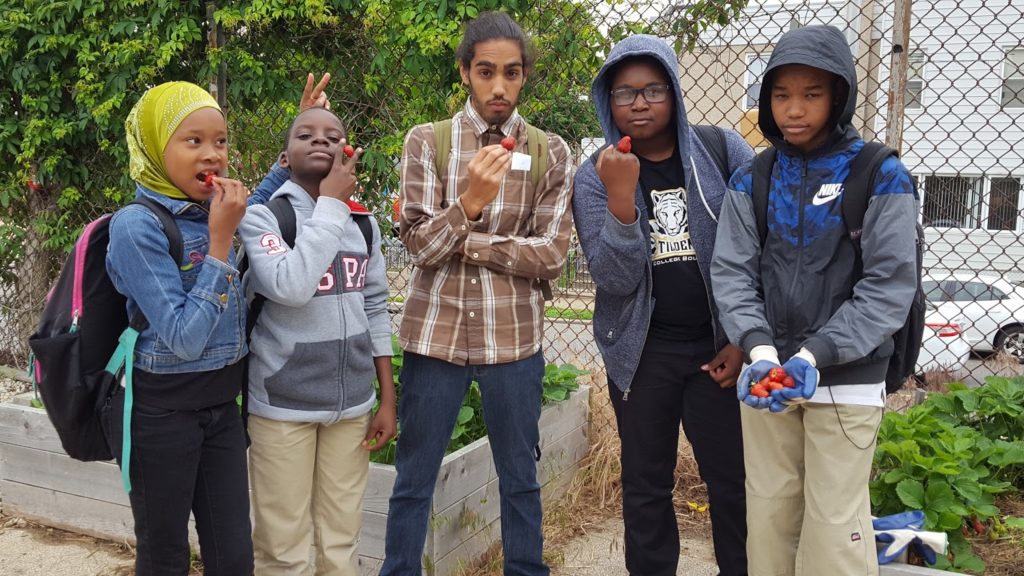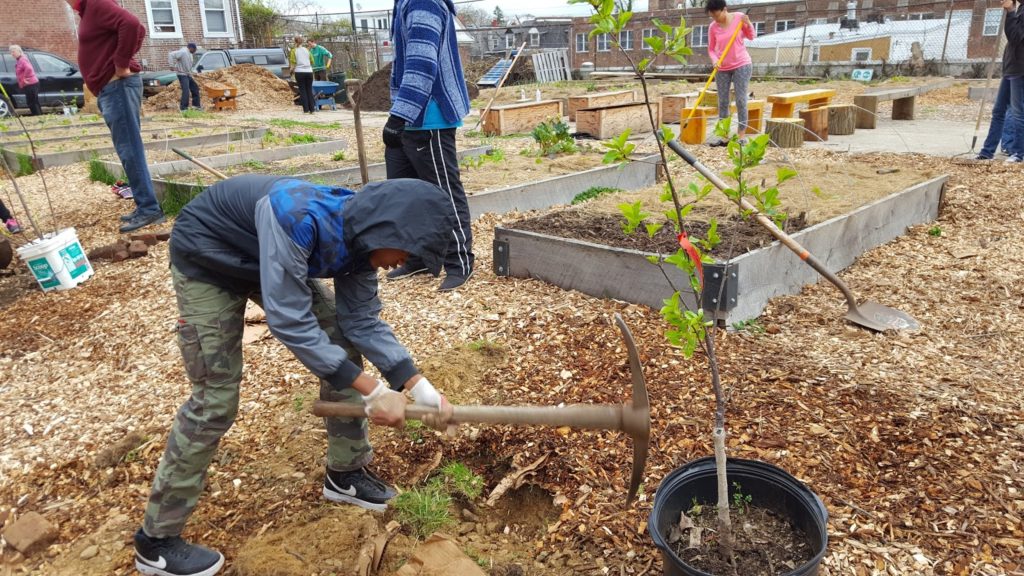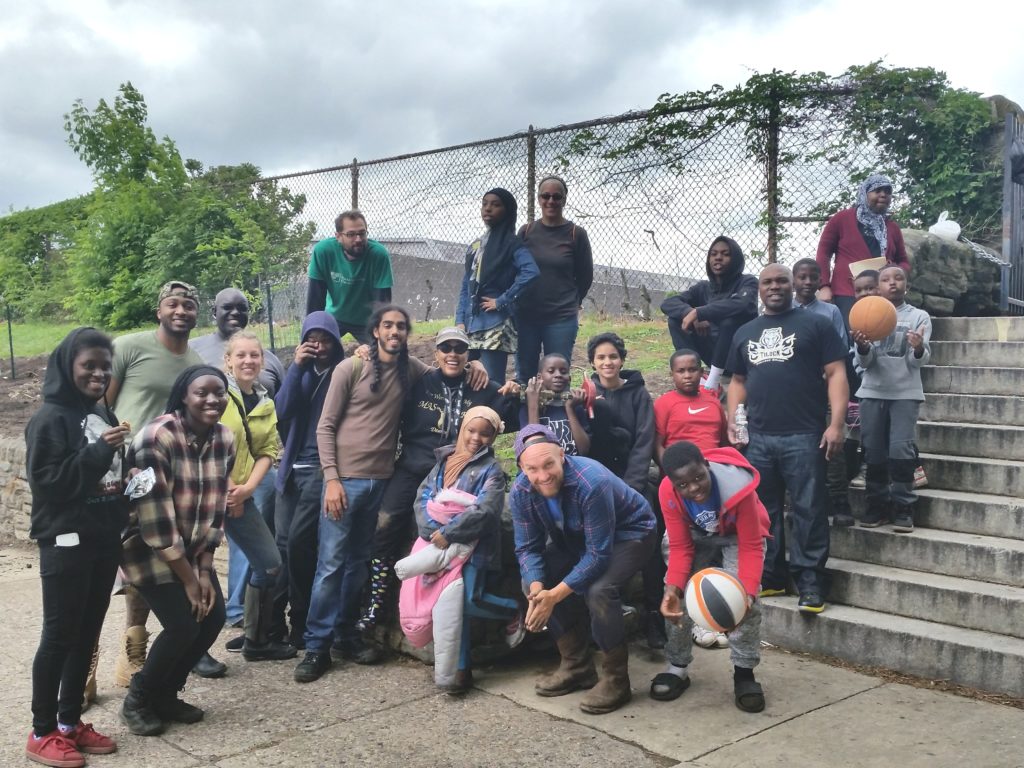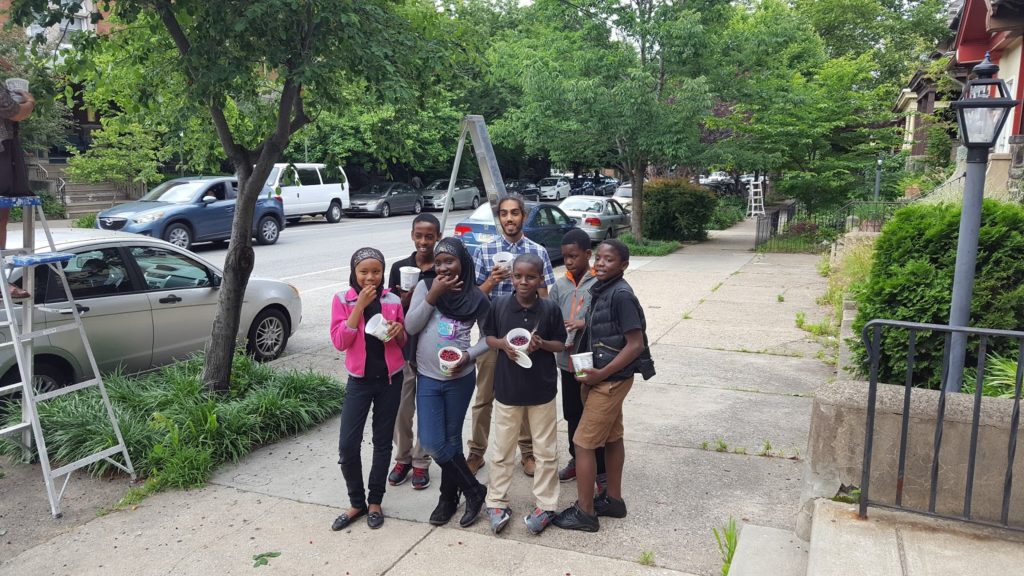
Cole Jadrosich is a literacy and agricultural educator at Tilden Middle School, where he leads an after-school garden club for fifth through eighth graders. Here, he shares his experience partnering with POP and cultivating the garden as a place where students learn self-reliance through farming. In addition to planting a new orchard at Tilden this spring, Jadrosich also brought his students on field trips to variety of other POP orchard plantings, harvests, and other events across the city this season.
Partnering with POP gave my students and I more than just the chance to plant trees; it provided us with experiential learning opportunities fostering skills for changing our communities while understanding proper plant care. Our classroom became orchards and gardens amid a sea of concrete; our materials morphed into natural resources and tools to shape them. Our curriculum was no longer worksheets and textbooks–rather, a call to direct action, creating and learning how to design agricultural systems that can provide communities with food, medicine, and sustainable practices to help them become cleaner, healthier, independent, and more closely connected.
My mission with expanding the garden and planting the orchard at Tilden Middle School is focused on providing spaces and resources for the youth to develop their own agency and repertoire of skills to be self-reliant. My students shared profound reflections on their experiences with engaging in experiential learning that specifically taught agriculture and permaculture.
A Tilden 5th grader stated, “I think hands-on activities are really good because they teach you life skills. You’re going to know if you need it or not. It’s going to get us ready in life because we’re not just going to be in the house eating potato chips all our lives. We want to make fresh foods so we can live longer. It is going to prepare us for life by knowing that we don’t have to buy corner store food, always going to worry, always going to rely on the store. We can rely on ourselves.”
An 8th grader shared, “I feel like hands on activities would encourage kids to engage more [in school] because they are more useful. You’re gonna know if you need it or not because you’re going to think ‘oh, how is this going to occur in my life?’ When we can learn how to make food for ourselves, not go to the store, we learn more efficient ways to live.” Students expressed that the activities we engaged in not only made learning more interesting, but that they also liked the fact that it was helping them learn a skill that prepared them for their futures. Learning strategies through hands-on activities made the practicality of growing food so much clearer to students and how it can benefit their lives.

Working in those natural spaces also gave me more autonomy and agency to be a more effective educator. Public schools in Philadelphia are often thirty children to one adult in a classroom for 60 minutes: which amounts roughly to each child having just 2 minutes of attention. In a classroom where a handful are learning English, coping with trauma and poverty, and have reading difficulties, two minutes for relationship building, instruction , questions, collaboration, and sometimes redirection is not much. Two minutes to also teach a curriculum that is disconnected from the context of students’ lives and heritages and does not serve to give them skills to cope better, think critically, and live healthier. Outsides the bricks of the institution, in a natural space with 5-8 students, that pressure and congestion is alleviated. By developing a natural classroom in the garden, and reducing the number of children per educator, it increases the amount of interaction time I could have with students, resulting in stronger relationships being built, more trust established, and more chances to engage the student with inquiry and reflection to build their critical thinking and field knowledge.
Giving a student a worksheet on how unsustainable farming practices affect their food, or watching a video on deforestation might be informative. And a multiple choice assessment may prove a pupil remembers select facts from those materials. But those are just learning activities that make students aware of giant conceptual mega-complications, not skills to actually solve them.

When we leave the confines of the classroom, we can then create feasible learning tasks that actually give ourselves the skills to counter environmental destruction and industrial food systems. Telling youth to figure out a way to clean the air and stop food producers from using GMOs is out of reach from an individual perspective; especially when you’re told to sit at a desk all day inside. But teaching youth how to plant, which in effect cleans the air and creates access to organic food is motivating and engaging because it is less complicated; a realistic and straightforward task. And, when we learn planting and caring for the plants through experiencing them with our senses, we learn it requires diligence and patience, but is practical and viable.
POP was one of our partners that granted us access to those spaces that helped us escape the confines of regimented education. Not to say there is nothing to be learned in the school system, and not to say formal school has no constructive outlets. But the growing spaces allowed us to learn about the natural world, how to shape it, how to build community around it, and how to produce resources we can utilize to benefit ourselves and our communities. The products the students produced weren’t pieces of paper with arbitrary grades on them, but natural resources they could use to become healthier or provide for their communities. We can’t do that with a worksheet or a test score!

I am trying to evolve the “garden club” at Tilden into a full time summer and after-school agriculture program. My goal is to integrate hands-on gardening and orchard care experience with inquiry-driven research projects centered around plant/insect literacy, maintenance and repair in the growing spaces, and indigenous knowledge. Currently, I am trying to acquire enough funding to sustain the program through the summer. Your support can give me the power and resources to provide my students with the learning opportunities they need to continue developing their own agency. To support the campaign, visit https://www.gofundme.com/supporttilden
This POP Partner Feature written by guest writer, Tilden Middle School educator Cole Jadrosich.
SUPPORT US! If you found this entry useful, informative, or inspiring, please consider a donation of any size to help POP in planting and supporting community orchards in Philadelphia: phillyorchards.org/donate.